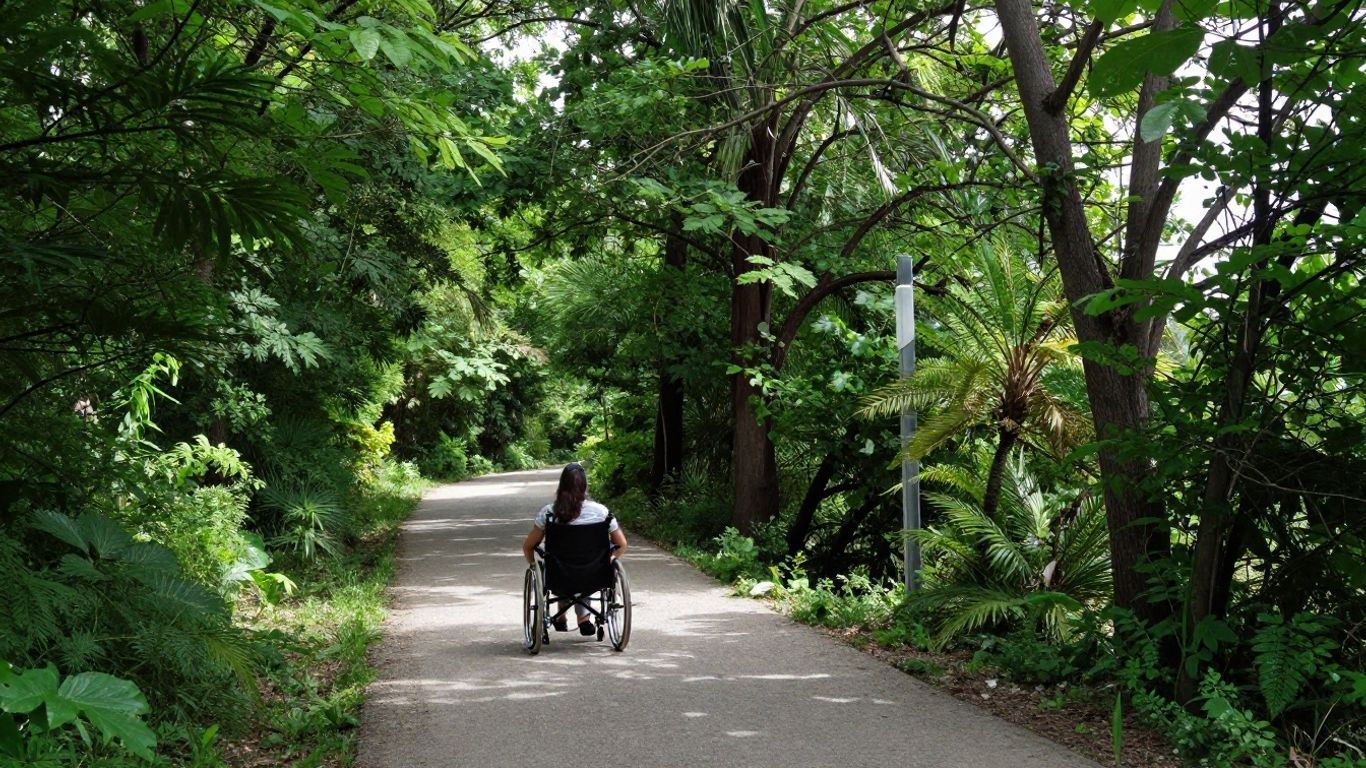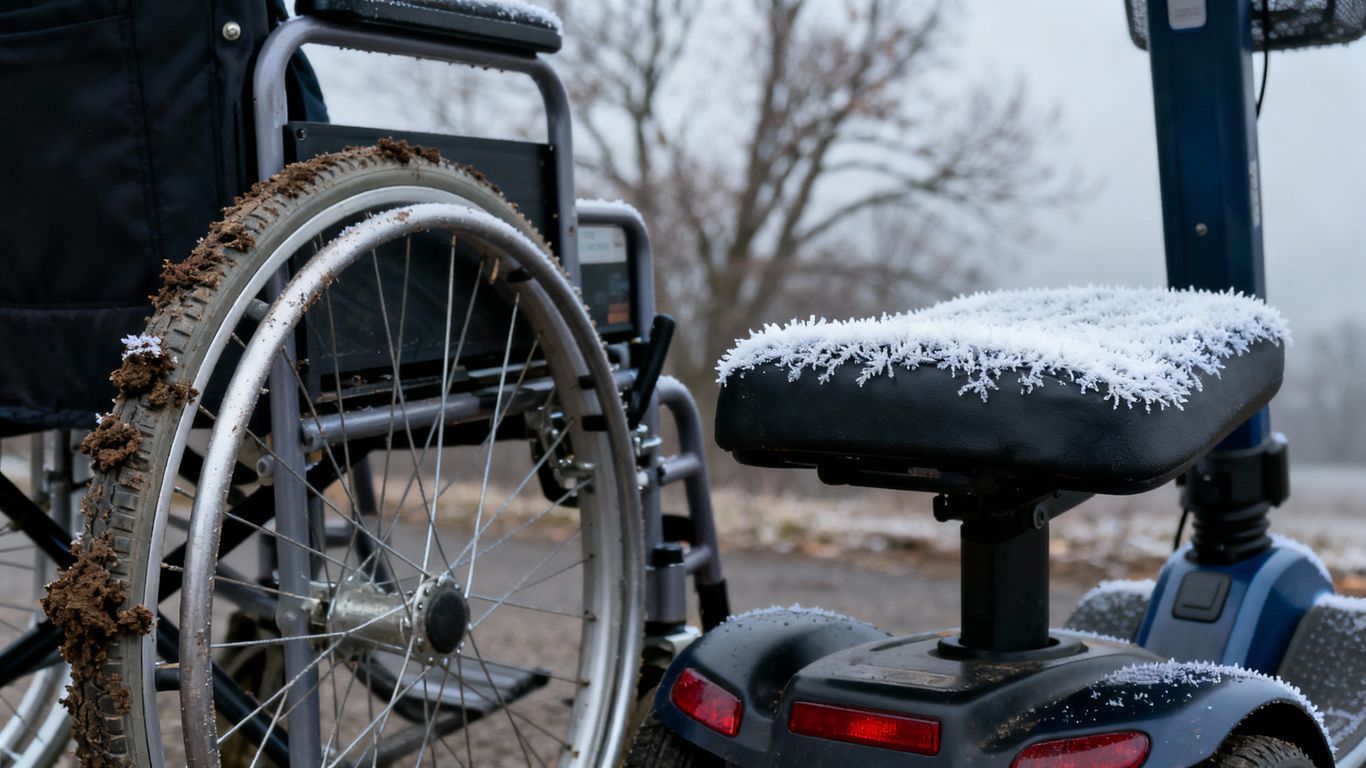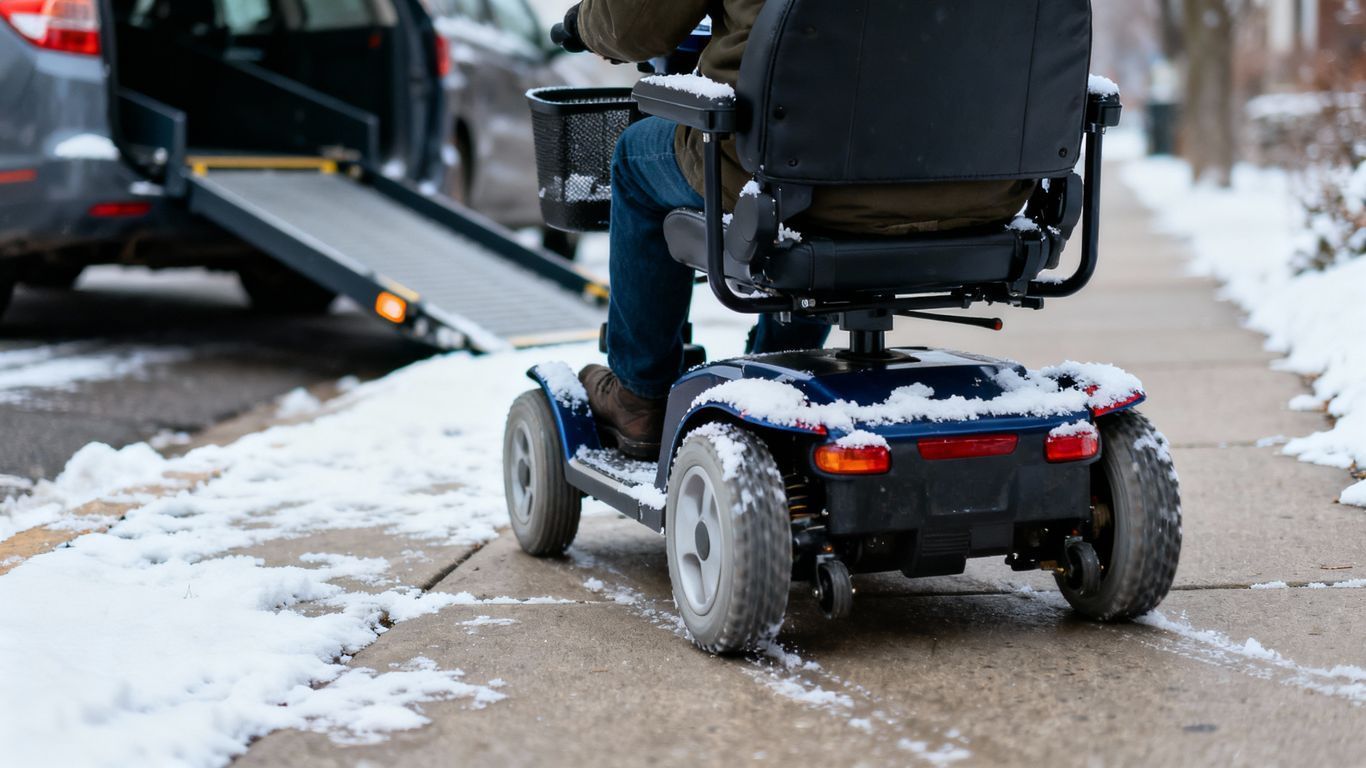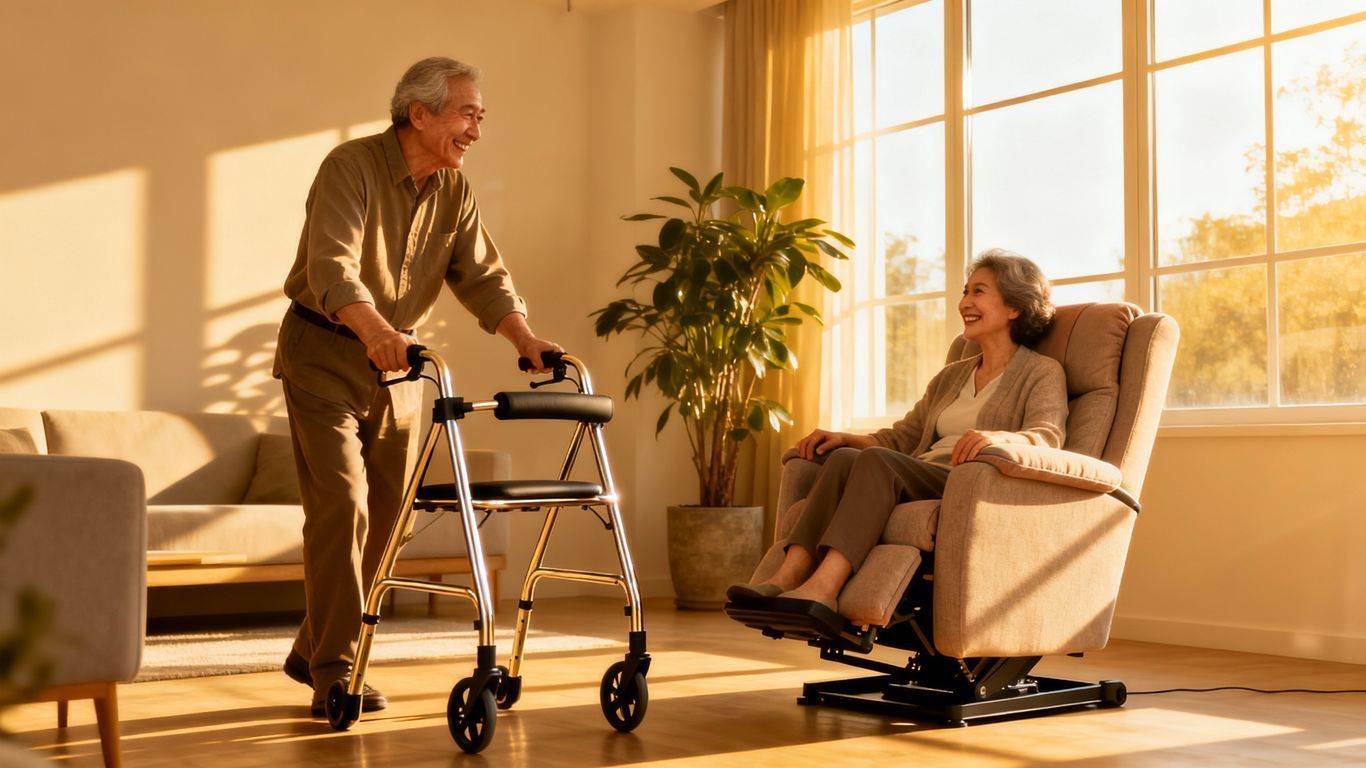Top Tips for Choosing the Right Stair Lift in LaFayette, Ringgold, Chickamauga, Ft. Oglethorpe, Dalton & Chattanooga
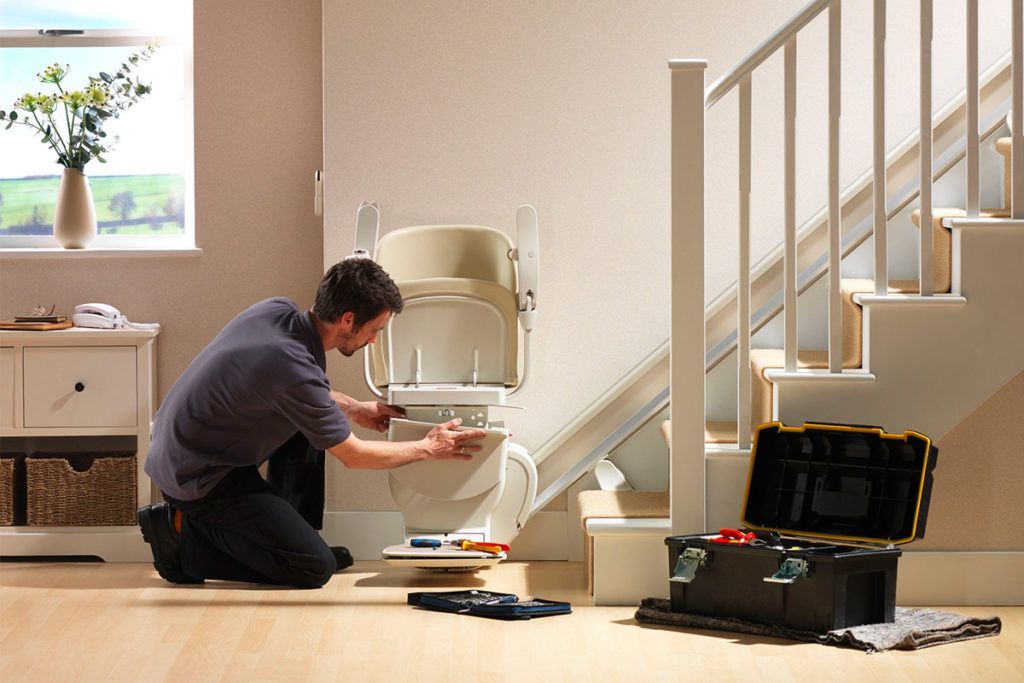
Getting a stair lift can really make a big difference if you're having trouble with the stairs at home. Whether you're in LaFayette, Ringgold, Chickamauga, Ft. Oglethorpe, Dalton, or Chattanooga, picking the right one is important. Think about your house, how you move around, and what kind of lift makes sense for you. We'll go over some tips to help you figure it all out, including details on stair lift installation LaFayette Ringgold Dalton Chattanooga.
Key Takeaways
- Check your stairs to see if a stair lift will fit and how it will work in your home.
- Think about how you move and what you need the lift to do for you.
- There are different kinds of stair lifts, like straight or curved ones, so pick the one that matches your stairs.
- Make sure to measure your stairs correctly before you buy or order.
- Know the weight limits and look at the power options and safety features available.
1. Assess Your Home's Staircase
Before you even start looking at stair lifts, you really need to get a good look at your stairs. Not all staircases are the same, and what works for one house might be a total no-go for another. Think about the shape first. Is it a straight shot from bottom to top? Or are there curves, landings, or even tight corners? These details matter a lot because they affect the type of lift you can get and how it will fit.
Here are some things to check:
- Straight vs. Curved: This is the biggest difference. Straight stairs are simpler and usually cheaper to outfit. Curved or winding stairs need custom tracks, which means a longer wait and a higher price tag.
- Landings and Turns: If you have landings, especially if they're narrow, you need to make sure there's enough space for the chair to stop and turn without hitting walls or doors. The same goes for any tight turns.
- Wall Clearance: Check how much room you have on the side of the stairs. You don't want the lift to be so wide that it blocks the hallway or makes it hard for others to use the stairs when the lift isn't there.
- Doorways: Pay attention to any doors at the top or bottom of the stairs. The lift needs to stop in a spot where the door can still open and close freely, and where you can get on and off safely.
It's also worth considering the material of your stairs. Are they carpeted, wood, or tile? While most lifts can handle different surfaces, very thick carpet or uneven surfaces might need a bit more attention during installation to make sure the track is secure and the ride is smooth.
Knowing these details upfront will save you a lot of headaches later on. It helps narrow down your options right from the start and makes the whole process much smoother when you talk to companies about what you need.
2. Consider Your Mobility Needs
When you're looking at stair lifts, the most important thing to think about is what you actually need them for. Your personal mobility level will really guide the best choice. Are you just a bit unsteady on your feet, or do you have significant trouble with balance and strength? This makes a big difference. For instance, if you can stand and pivot easily, a basic model might be fine. But if you have trouble standing for even short periods, you'll want something with a more supportive seat and maybe even a footrest that comes up automatically.
Think about these points:
- How much help do you need to get up and sit down? Some lifts have more padded seats and armrests that offer better support.
- Can you move your legs easily? If bending your knees is tough, you might need a lift with a higher seat or a footrest that adjusts.
- Do you need to carry things up and down the stairs? Some lifts have larger seats or optional carriers.
It's also worth considering how you'll use the lift throughout the day. Will it be for every trip up and down, or just occasionally? This can influence the type of controls you prefer and how quickly you need the lift to move. Getting the right fit for your body and how you move is key to making sure the stair lift is actually helpful and not a hassle. You want something that makes life easier, not more complicated. For example, if you have hip or knee pain, a seat that swivels at the top of the stairs can be a real game-changer, letting you get off the chair without twisting your body awkwardly. It’s all about making the transition from the lift to the landing as smooth as possible. You can find great options for home modifications that cater to these specific needs.
3. Explore Different Stair Lift Types
When you start looking at stair lifts, you'll quickly see there isn't just one kind. They've really thought about different needs and stair setups. Understanding the basic types is key to finding the best fit for your home and how you move around.
Here are the main categories you'll likely come across:
- Straight Stair Lifts: These are the most common. They run on a single, straight track that follows your staircase exactly. If your stairs don't have any turns or landings, this is probably what you'll need.
- Curved Stair Lifts: Got a winding staircase or a landing in the middle? A curved stair lift is designed for that. The track is custom-made to follow the exact path of your stairs, including any bends or turns. This is a more specialized option, and the track is built specifically for your home.
- Outdoor Stair Lifts: If you need to get up to a porch or a different level outside, there are stair lifts made for outdoor use. They're built to handle different weather conditions.
The biggest difference you'll notice is how the track is made. Straight ones are pretty standard, but curved tracks are a whole different ballgame. They have to be measured and built precisely for your unique staircase. It's not something you can just buy off the shelf; it's a custom job.
When you're checking them out, think about the ergonomics of the seat and armrests too. Some have folding seats and footrests, which is handy if you need to keep the path clear when the lift isn't in use. It's worth sitting in a few if you can, just to get a feel for what's comfortable for you.
4. Measure Your Staircase Accurately
Getting the measurements right for your staircase is a big deal when picking out a stair lift. You really want to make sure it's going to fit properly and work safely.
Here’s what you need to think about:
- Overall Length: Measure the total distance from the bottom step to the top landing. This tells us how long the track needs to be.
- Number of Steps: Count each step. This is important for the lift's design and how it will attach.
- Stair Width: Measure the width of your stairs at their narrowest point. This helps determine if the lift will fit without blocking the way.
- Landing Space: Check how much room you have at the top and bottom of the stairs. You need enough space for the chair to swivel and for you to get on and off easily.
It might seem like a small detail, but getting these measurements exact is super important. A lift that’s too long or too short, or one that doesn’t have enough room to operate, just won’t work right. It’s better to be precise from the start.
Don't forget to measure any curves or landings if your stairs aren't straight. This kind of detail helps make sure the track can be made to fit your specific staircase perfectly.
5. Understand Weight Capacity
When you're looking at stair lifts, one of the most important things to get right is the weight capacity. It’s not just about comfort; it’s about safety, plain and simple. You need a lift that can comfortably and reliably handle your weight, plus any extra weight you might carry, like groceries or a pet.
Think about it this way:
- User's Weight: This is the primary factor. Be honest about the maximum weight the lift will need to support.
- Carrying Items: Will you typically bring a bag, a book, or even a small child with you on the lift? Factor that in.
- Future Needs: While you hope for the best, it’s wise to consider if your needs might change over time. Choosing a lift with a slightly higher capacity than you currently need can be a smart move.
Most stair lifts have a stated weight limit, and it’s really important not to exceed it. Going over the limit can strain the motor, affect the braking system, and generally make the lift unsafe. It’s better to be a bit overprepared than to risk an accident. You can find information on different models and their capacities when you look into local stair lift providers.
It’s easy to overlook this detail when you’re focused on other features, but the weight capacity is a non-negotiable safety specification. Make sure the model you choose is rated for your needs, and don't hesitate to ask the dealer for clarification if you're unsure about anything. They can help you find a model that fits your specific situation perfectly.
6. Evaluate Power Options
When you're looking at stair lifts, you'll notice they run on different power sources. Most modern ones plug right into a standard wall outlet, which is pretty convenient. They usually have a battery backup, too, which is a big deal.
This battery backup means the lift will still work even if the power goes out. That’s a really important safety feature to think about, especially if you live in an area where power outages happen sometimes. You don't want to get stuck halfway up the stairs!
Here’s a quick rundown of what to consider:
- Standard Outlet Power: Most lifts use this. They charge up when not in use.
- Battery Backup: Almost all good ones have this. It’s your safety net.
- Charging System: Some lifts have a charging station at the top or bottom of the stairs, while others charge continuously along the track. It’s good to know how it works so you don’t have to worry about it.
Think about how your home's electrical setup is. If your outlets are a bit old or you've had issues with power before, it might be worth getting an electrician to check things out before you buy. You want to make sure the power source is reliable for your new lift.
7. Look for Safety Features
When you're looking at stair lifts, safety has to be the top thing on your mind. It’s not just about getting up and down the stairs; it’s about doing it without worry. You want a lift that feels secure and reliable every single time you use it.
Think about these important safety aspects:
- Seatbelt: Most modern lifts come with a seatbelt, but check how easy it is to buckle and unbuckle. Some have a simple buckle, while others have a more secure locking mechanism.
- Armrests: Sturdy armrests are key for stability when you're sitting down or getting up. They should be solid and not wobbly.
- Footrest: The footrest should fold up automatically when the seat is lifted, so it doesn't get in the way on the stairs. It also needs to be strong enough to support your feet comfortably.
- Obstruction Sensors: Many lifts have sensors that stop the chair if something is in its path on the stairs. This is a really good feature to have, especially if you have pets or children around.
- Emergency Stop Button: Make sure there's an easily accessible button to stop the lift quickly if needed.
It’s also worth checking if the lift has a smooth start and stop. A jerky movement can be unsettling and might make you feel less secure. You want a ride that’s gentle and controlled, not one that jolts you around. This kind of smooth operation is a good indicator of a well-made and safe lift.
Don't forget to ask about the weight capacity, which we'll cover next, but also consider how the lift itself is built. A solid construction means it’s less likely to have issues down the line. You can find more information on home modifications for safety at North Georgia Mobility.
8. Test the Controls and Comfort
Once you've narrowed down your choices, actually trying out a stair lift is a big deal. You want to make sure it feels right for you, you know? It's not just about getting up and down the stairs; it's about doing it comfortably and without any fuss.
When you're looking at different models, pay attention to a few things:
- How easy are the controls to use? They should be simple to understand and operate, even if you have limited hand strength or dexterity. Buttons that are too small or too stiff can be a real pain.
- Does the seat feel supportive? Think about how long you'll be sitting on it. Is the padding enough? Does it feel stable?
- Are the armrests positioned well? They should be easy to reach and provide a good place to rest your arms without getting in the way when you sit down or stand up.
It's really important to feel confident operating the lift yourself. Don't be shy about asking the salesperson to let you try it out. You'll want to test the call buttons too, just to make sure they're accessible from both the top and bottom of the stairs. Getting a feel for the ride quality is also key; it shouldn't be jerky or too fast. Finding a lift that's comfortable and easy to manage can make a huge difference in your daily life, and you can find great options from local providers like North Georgia Mobility.
Remember, this is a piece of equipment you'll be using every day. If it doesn't feel right during the test, it's probably not going to get better once it's installed in your home. Take your time and trust your gut feeling about what works best for your comfort and ease of use.
9. Research Installation Process
Once you've picked out the perfect stair lift, the next big step is figuring out how it all gets put in. A professional installation is almost always the way to go. While it might seem like a simple bolt-on job, stair lifts involve electrical connections and precise mounting to your stairs. Getting it wrong can lead to safety issues or damage to your home.
When you're looking into installers, consider these points:
- Experience: How long have they been installing stair lifts specifically? Look for companies with a solid track record in your area, like those serving LaFayette and Ringgold.
- Credentials: Are they licensed and insured? This protects you in case of any accidents during the installation.
- Timeline: How long does a typical installation take? Will they need to do any prep work beforehand?
- Cleanup: What's their policy on cleaning up after the job is done? You don't want to be left with a mess.
It's a good idea to get a clear understanding of the entire process before the installers even arrive. Ask about how they'll secure the lift, where the power source will come from, and what kind of testing they'll do once it's in place. This way, you know exactly what to expect and can feel confident in the work being done.
Don't hesitate to ask for references or check online reviews. A reputable company will be happy to provide this information. You can often find resources for home accessibility modifications that might also cover installation services for mobility aids in Georgia, which could be helpful for finding local support.
Make sure to discuss any specific concerns you have about your staircase, like carpeted steps or unusual angles, with the installer beforehand. They can advise on the best approach and any potential challenges.
10. Compare Pricing and Warranties
Once you've narrowed down your choices, it's time to talk money and what happens after the sale. Getting a clear picture of the total cost and the warranty coverage is super important. Don't just look at the sticker price; ask about installation fees, any potential maintenance plans, and what exactly the warranty covers. Some warranties might only cover parts, while others include labor too.
When you're comparing, think about these points:
- Get multiple quotes: Don't settle for the first price you see. Reach out to a few different providers in the LaFayette and Chattanooga areas to see who offers the best value.
- Understand the warranty details: What's the duration? Does it cover mechanical breakdowns, electrical issues, or just specific parts? Knowing this can save you a lot of headaches down the road.
- Ask about service agreements: Some companies offer optional service plans that can provide regular check-ups and priority service. See if this makes sense for your budget and peace of mind.
It's also a good idea to check if the company offers any DIY repair information, especially if you're comfortable with basic maintenance. Sometimes, simple fixes can be done yourself, potentially saving you a service call. For those in the area, resources for DIY fixes and repair information might be available.
Remember, a good warranty and responsive customer service are just as vital as the stair lift itself. It’s an investment in your independence, so take the time to make sure you’re getting a solid deal that includes reliable support.
When you're looking at different mobility options, it's smart to check out how much they cost and what kind of protection they offer. This helps you make the best choice for your needs. Want to see how our prices and warranties stack up? Visit our website today to learn more!
Making the Right Choice for Your Home
So, you've looked at the different types of stair lifts and thought about what you need. It's a big decision, for sure, but it's all about making your home easier to get around. Remember to think about your specific stairs and what feels comfortable for you. Don't hesitate to ask questions when you talk to companies like North Georgia Mobility. They've been helping folks in LaFayette, Ringgold, Chickamauga, Ft. Oglethorpe, Dalton, and Chattanooga for a long time, and they know their stuff. Getting a stair lift can really make a difference in your day-to-day life, giving you back freedom in your own house. Take your time, do your homework, and you'll find the best fit.
Frequently Asked Questions
How do I know if I need a stair lift?
If climbing stairs has become difficult or unsafe for you, a stair lift can be a great solution. It helps you move between floors in your home without the strain of walking up and down the steps.
What's the difference between a straight and a curved stair lift?
A straight stair lift is for stairs that go up in one continuous line. A curved stair lift is custom-made for stairs that turn or have landings, fitting the exact shape of your staircase.
How much weight can a stair lift hold?
Most stair lifts are designed to carry between 300 to 400 pounds, but it's important to check the specific weight limit for the model you're considering to ensure it's safe for your needs.
Do stair lifts need a lot of power?
Stair lifts usually run on electricity and plug into a regular wall outlet. They often have battery backup, so they'll still work if the power goes out.
Are stair lifts safe to use?
Yes, stair lifts have many safety features like seatbelts, sturdy armrests, and sensors that stop the lift if it encounters an obstacle. They are designed to be very secure.
How long does it take to install a stair lift?
Installation typically only takes a few hours. Professionals will attach the track to your stairs and make sure everything is working correctly before they leave.
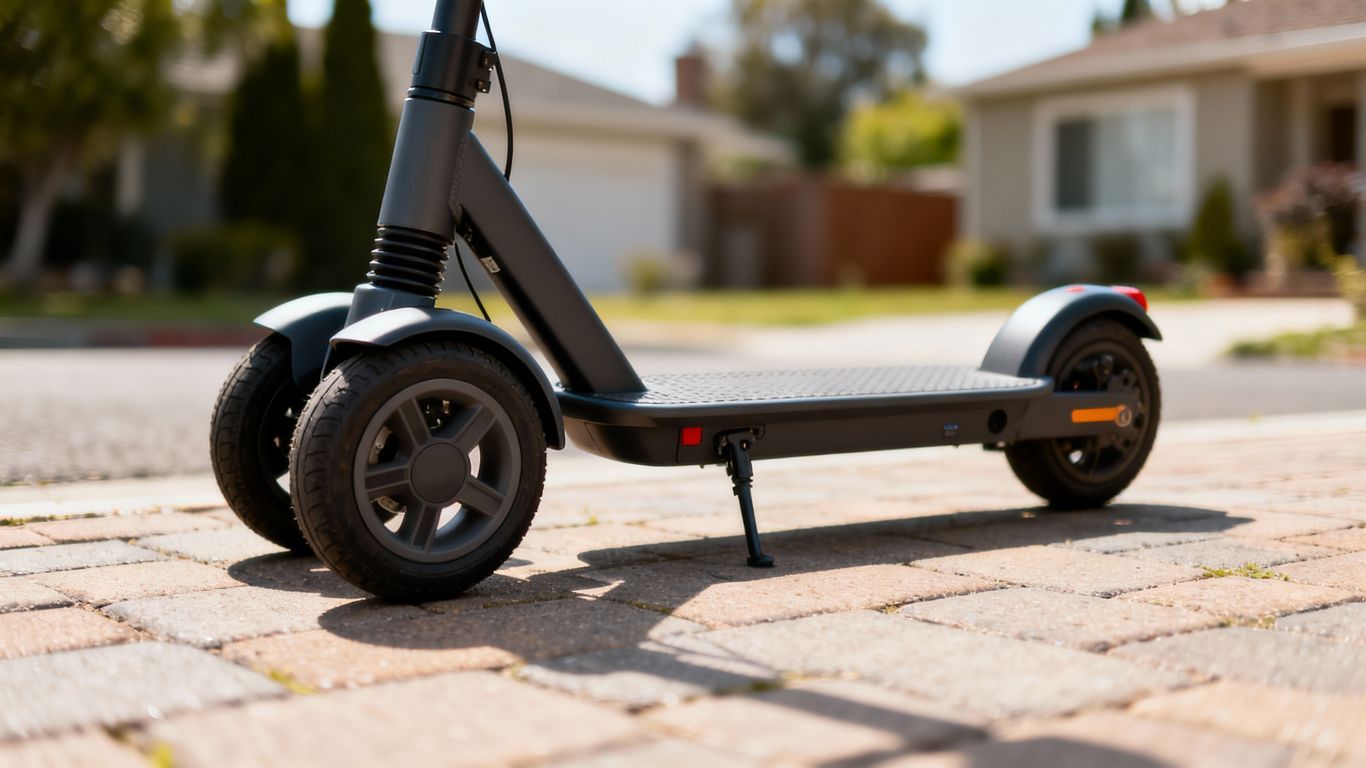
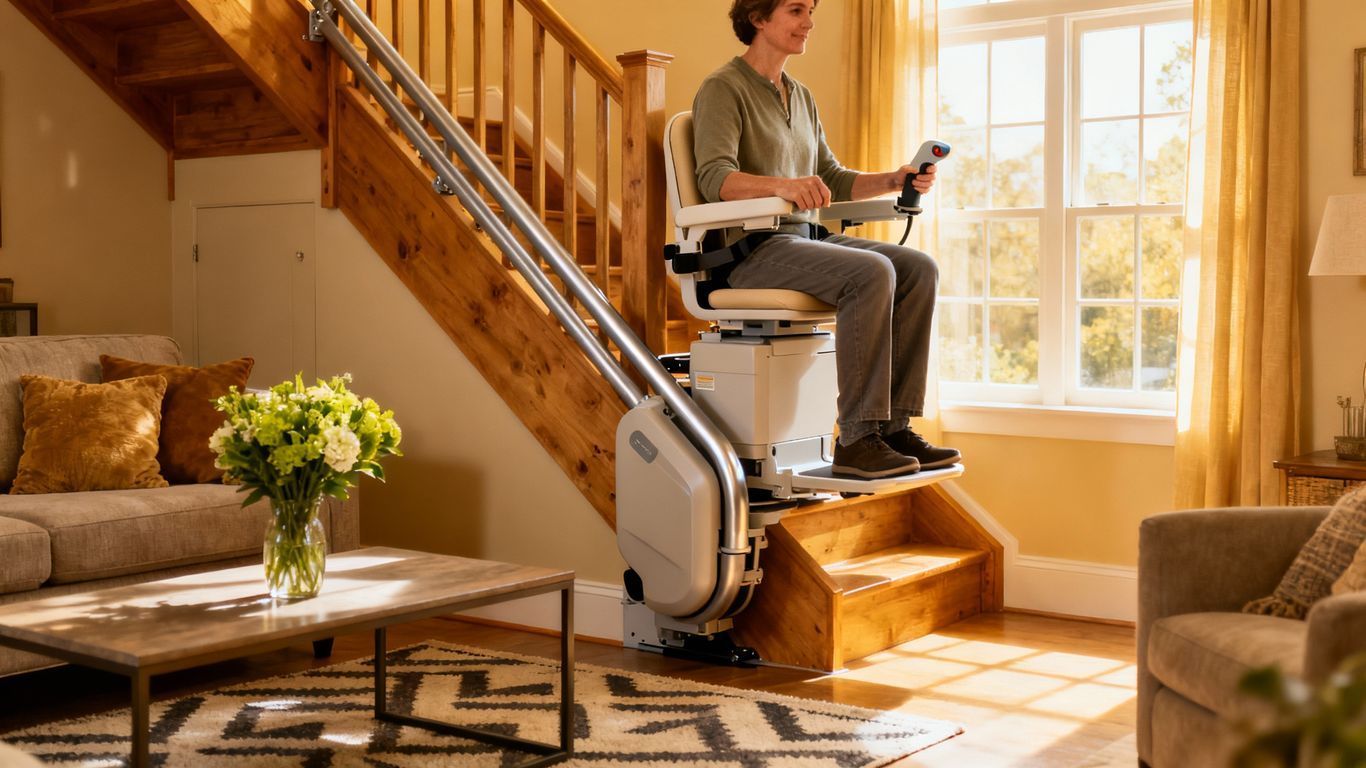
Why February Is the Perfect Time for Stair Lift & Home Accessibility Upgrades in Calhoun & LaFayette
